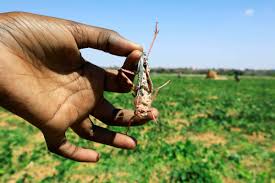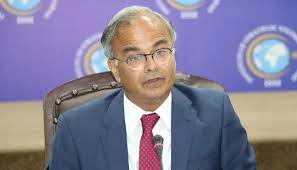Regional Cooperation to counter Locust threat

Islamabad: A high-level ministerial meeting was organized by the FAO Commission for Controlling the Desert Locust in South West-Asia (SWAC) at the request of four FAO member countries, Pakistan, Iran, India, and Afghanistan to present the latest desert locust situation and forecast; take stock of national, regional and global capacities; review contingency plans and preparations for addressing the potential desert locust threat, and identify gaps to propose actions.
Makhdoom Khusro Bakhtiar, Federal Minister for National Food Security & Research represented Pakistan at the meeting where he gave an overview of Pakistan’s action plan to control the locust threat. The Federal Minister proposed the formation of a high level technical committee, comprising of senior officers from Southwest Asian countries for effective management and control of the locust threat, the UN information center in Islamabad said on Friday.
The meeting was attended by Lt. General Muhammad Afzal, Chairman National Disaster Management Authority, Dr. Muhammad Hashim Popalzai, Secretary, National Food Security & Research and key technical staff from Pakistan, ministers and high officials from Iran, India and Afghanistan and key FAO experts in Rome and Pakistan.
“Setting up of a new agile technical and operational coordination mechanism under the FAO Commission for Controlling the Desert Locust in South West-Asia (SWAC) will allow information exchange, addressing gaps and cross border synchronisation of control operations.” Minà Dowlatchahi, FAO Representative in Pakistan.
The Assistant Director General FAO briefed countries on the current locust situation, the expected migratory patterns of the swarms, and recommendations for preparedness. The horn of Africa and South West Asia, regions affected by the infestations, have been divided into zones for better regional cooperation and coordination. FAO’s facilitation to the governments in their efforts to counter the infestations was discussed and countries were encouraged to come up with extensive national plans, which would ultimately contribute to the regional action plan. The e-Locust3 application developed by FAO was also presented which the countries were encouraged to use for gathering data on the ground.
A technical and operational coordination team will be formulated to increase coordination between the four countries, which will facilitate information exchange and preventive measures while addressing the gaps. The team would be comprised of national locust technical officers, as well as relevant authorities and will provide a platform for discussing threats, and the best planning and implementation of data, giving a regional overview of the locust situation.





